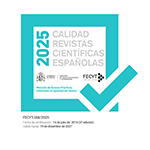De los fusiles a las urnas. FET-JONS antes las elecciones municipales (non natas) de 1946 .
Resumen
Este artículo analiza el proceso a través del cual Falange articuló su participación en las elecciones a concejales de representación familiar cuya celebración fue inicialmente fijada por el Gobierno para marzo de 1946. La base empírica del trabajo se asienta en documentación custodiada en el Archivo General de la Administración y procedente de dos órganos institucionales de FET-JONS: la Vicesecretaría General de Ordenación Social y el conjunto de jefaturas provinciales del Movimiento. La información obtenida de estas fuentes se inserta en el marco de la adaptación de FET-JONS y del propio régimen a la nueva comunidad internacional surgida de la derrota de las potencias del Eje en 1945 y se utiliza para describir con detalle los mecanismos que articuló Falange para intervenir en todas las fases de la organización de las citadas elecciones. El artículo concluye que, pese a las dificultades por las que atravesó desde mediados de 1945, Falange no permaneció pasiva ante la convocatoria electoral de 1946. Por el contrario, reaccionó de inmediato con el objetivo de no salir malparada de semejante coyuntura y, a la vez, aprovechar dichas elecciones para consolidar su poder. La Organización Sindical Española fue la encargada de llevar a cabo dicha intervención. La forma en la que lo hizo puso de manifiesto que a finales de 1945 el partido gozaba de un poderoso aparato institucional perfectamente arraigado dentro del régimen y con una gran coordinación entre los organismos nacionales y los periféricos.
Descargas
Licencia
Aquellos autores/as que tengan publicaciones con esta revista, aceptan los términos siguientes:
a. Los autores/as conservarán sus derechos de autor y garantizarán a la revista el derecho de primera publicación de su obra, el cuál estará simultáneamente sujeto a la Licencia de reconocimiento de Creative Commons Reconocimiento-No comercial-Sin obra derivada 4.0 España que permite a terceros compartir la obra siempre que se indique su autor y su primera publicación esta revista.
b. Los autores/as podrán adoptar otros acuerdos de licencia no exclusiva de distribución de la versión de la obra publicada (p. ej.: depositarla en un archivo telemático institucional o publicarla en un volumen monográfico) siempre que se indique la publicación inicial en esta revista.
Plagio y fraude científico
La publicación de un trabajo que atente contra los derechos de propiedad intelectual será responsabilidad de los autores/as, que serán los que asuman los conflictos que pudieran tener lugar por razones de derechos de autor. Los conflictos más importantes pueden darse por la comisión de plagios y fraudes científicos.
Se entiende por plagio:
1.Presentar el trabajo ajeno como propio.
2.Adoptar palabras o ideas de otros autores sin el debido reconocimiento.
3.No emplear las comillas u otro formato distintivo en una cita literal.
4.Dar información incorrecta sobre la verdadera fuente de una cita.
5.El parafraseo de una fuente sin mencionar la fuente.
6.El parafraseo abusivo, incluso si se menciona la fuente.
Las prácticas constitutivas de fraude científico son las siguientes:
1.Fabricación, falsificación u omisión de datos y plagio.
2.Publicación duplicada.
3.Conflictos de autoría.












